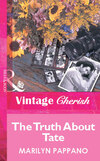Kitabı oku: «Trading Secrets», sayfa 2
He lifted his head. Now that the pain that had taken precedence had reduced itself to a dull, throbbing ache, he was conscious of his lovely angel of mercy’s clean, powdery scent, the gentleness of her touch, the nearness of her body.
With his head still inches from hers, he was also aware of the curve of her throat, the feminine line of her jaw and her lush, unadorned mouth.
Her breath caressed his skin as it slowly shuddered out. Feeling its warmth, the sensations that had touched something starving in his soul gave way to an unmistakable pull low in his groin.
Caution colored her delicate features as she lifted her hand to the side of his face and brushed off the moisture still dripping from his hair. With a faint smile, she eased her hand away.
Stepping back, she picked up the towel she’d brought him earlier and draped it over his shoulders. “You’re better.”
“Much.” He cupped his throbbing shoulder with his hand, felt the alignment of joint and bone. He couldn’t tell if he’d torn anything major, or if his shoulder and arm were just going to be the color of an eggplant for the next few weeks. All he cared about just then was that the searing pain was gone. “Thank you.”
With another small smile, she picked up the edge of the towel, wiped it over one side of his hair and took another step back. “You could use another one of these.”
“What I could use is something to make a sling. Or I could use this for one,” he suggested, speaking of the towel she’d draped over him. “Do you have something to fasten it with?”
He’d seemed big to her before. Now, with his feet planted wide as he sat watching her, his six-pack of abdominal muscle clearly visible between the sides of the towel and with the need for urgency gone, he totally dominated the small, dilapidated space.
Not sure if she felt susceptible or simply aware, anxious to shake the unnerving feelings, she turned to the box she’d opened earlier.
“How did you wreck your car?”
“I was trying to avoid a deer. The road was slick and I lost control.”
“Did you hit it?”
“Missed the deer. Hit a tree.”
She picked up another towel for him to dry off with and held up a safety pin.
“That’ll work,” he told her.
Only moments ago she had cradled his head while she’d quietly stroked his hair. Now there was no mistaking the faint wariness in her delicate features as she stepped in front of him once more.
He’d tucked the middle of the rectangular terry cloth under his arm and pulled one end over his shoulder. Apparently realizing what he had in mind, she caught the other end to draw to the other side and, while he held his arm, pinned the sling into place behind his neck.
“Thanks,” he said again, conscious of how quickly she stepped away. Glad to have use of his other arm, he took the hand towel she’d dropped on his thigh and wiped it over his face. She was disturbed by him. That was as apparent as the uneasy smile in her eyes.
They were even, he supposed. He was disturbed by her effect on him, too. He was also more than a little curious about who she was.
If she knew old Doc Wilson, she had to be a local. Yet, he knew he had never seen her before. He would have remembered her eyes. They were the crystalline blue of a summer sky, clear, vibrant. And troubled.
He looked from where she now bent to pick up what looked like bits of broken pottery to the cardboard boxes. One sat on the counter. Dishes matching the crimson red of the shards filled part of the cabinet above it. Another box sat empty, presumably relieved of the cleaning supplies and pots and bright-red canisters piled on the old electric range.
“Moving in?”
“Trying to.”
“That’s interesting,” he observed mildly. “I hadn’t heard anything about this place being rented or sold.” He knew he would have, too. Word would have hit the clinic or Dora’s Diner within minutes of papers being signed. “The way people talk around here, something like this doesn’t usually slip by.”
Without glancing up, she rose with several pieces of bowl in her hand and dumped them into the empty box.
In the far corner of the room, near the space a table and chairs should have occupied, bedding the color of spring grass and sunshine was laid out by four pieces of luggage.
“I imagine word would have leaked out by way of the power or phone company, too. My office manager has a cousin who works for one of the utility companies over in St. Johnsbury. I’m pretty sure someone would have mentioned utilities being hooked up out here.”
He clearly knew they hadn’t been. He just as clearly thought she was a squatter.
“I haven’t had a chance to have the electricity turned on.” Utility companies tended to want their customers to have jobs. And even if she did get work at the diner, it would be a while before she could afford a phone. “I just got here this afternoon. And I’m not renting or buying,” she explained, trying not to feel defeated by what she’d been reduced to doing. “This house belongs to my family. My name’s Jenny. Jenny Baker.”
He’d wiped the spare towel over his head, leaving his hair ruffled as it probably was after he’d dried from his shower. His focus never left her face as he set the towel on the counter and raked his fingers through his hair.
Without the pain clouding his eyes, his level gaze seemed harder to hold. From the way he watched her, she couldn’t tell if he believed her or not.
She’d had to prove herself entirely too often lately.
“This place has been vacant since Grandma died three years ago.” A squatter wouldn’t know that. “The real estate market has been so bad since the quarry had all those layoffs that Mom hasn’t been able to sell it. She was barely able to sell the house I grew up in after dad died last year.”
With no other relatives in Maple Mountain, her mom had moved to Maine to live with Jenny’s sister, Michelle, and Michelle’s growing family. Jenny might have mentioned that, too, had Greg not been frowning at her.
“What?” she asked, thinking he could at least have the decency to believe her after causing her to break her bowl.
Greg rose from the stool. With his arm supported by the makeshift sling, he took a step toward her. The light from the oil lamps cast everything in a pale-golden glow. That soft light also had a certain concealing effect. Not only did it take the worst of the dinginess from the derelict-looking room, it helped mask the faint bruising that bloomed along her jaw and the raw scrape beneath her thick bangs.
It was the glimpse of the scrape that had caught his attention when she spoke. Until then, he’d only noticed the discoloration along her jaw when she’d turned her head.
She’d winced when he’d grabbed her arm a while ago.
“I hurt you.” He spoke the conclusion quietly as he glanced at the sleeve of her sweatshirt. Wondering if there were more bruises he couldn’t see, his physician’s training and experience kicked in. “When I grabbed your arm,” he explained, since she suddenly looked puzzled, “I hurt you, didn’t I?”
“No. No,” she quickly repeated. The discomfort had been nothing compared to his. “You didn’t do anything.”
“Let me see your arm.”
“That’s not necessary.”
She’d suspected he was stubborn. She knew it for a fact when he reached over and tugged up her loose sleeve himself.
Three long bruises slashed her forearm.
Jenny stared down at them. “Oh,” she murmured. A few hours ago, they were merely stripes of pale pink.
“Bad relationship?” he asked.
“Bad luck,” she returned, pulling down her sleeve. “I’m not camping out in an abandoned house to escape an abusive boyfriend, if that’s what you’re thinking.” She didn’t care to mention that a relationship was responsible for that bad luck to begin with. If she’d never met Brent, she wouldn’t have lost everything and been forced to move. “I was mugged this morning.”
Greg was clearly an intelligent man. He was also, apparently, a hard sell.
“It’s true!” she insisted, seeing his doubt, hating the awful helpless feeling that came with not being believed. “I moved from Boston this morning. This guy was hiding behind the bushes near my apartment while I was loading up my car. When I crossed from my stoop to my car with my last box, he shoved me down and tried to grab my purse. I’d had a really bad week. A really bad month, actually,” she qualified, her hands now on her hips, “and I wasn’t about to let some greasy little jerk in a hooded sweatshirt take what little cash I have, my credit cards and my car keys.”
“So you hung on to your purse,” he concluded flatly.
“You bet I did. That’s when he grabbed my arm to make me let go. But that wasn’t going to happen,” she assured him. “When he started dragging me, I wrapped myself around a parking meter and kicked him in his crotch. The last I saw of him, he was limping down the hill holding himself.”
Greg lifted his chin, slowly nodded. Hitting a sidewalk would explain the scrape on her forehead. The force of being grabbed explained the fingerprints on her arm. The bruising on her jaw could have been caused by colliding with the metal pole of the parking meter, the ground or even the guy’s hand.
His glance moved from her boyishly short, sassy hair to her running shoes. He figured she was somewhere around five feet four inches, 120 pounds, tops. Considering that there didn’t appear to be a whole lot to her curvy little body musclewise, he didn’t know whether to admire her gutsy tenacity or think her utterly foolish. He’d known gang-types to maim or kill for pocket change. Having worked his residency in an inner-city hospital, he’d treated their victims often enough.
“Did the police catch the guy?”
Her glance shied from his. “I didn’t want to deal with the police.”
“You didn’t file a report? Give them a description?”
“Of what? An average-size, twenty-something Hispanic, Puerto Rican, black, Haitian, Mediterranean or very tanned white male in baggy black pants and a gray sweatshirt with the hood tied so all that showed was eyes?”
“What color were they?”
“Brown.”
“There had to be something distinguishing about him.”
“If there was, I was too busy hanging on to my purse to notice it. I’ve had enough of detectives to last me a lifetime. The last thing I wanted to do was put myself in the position of having to answer to them again.”
Sudden discomfort had her glancing down at a broken nail. “So that’s what happened to my arm,” she concluded, looking back up. “How’s yours? You’re bruised up way worse than I am. Do you want me to drive you over to the hospital in St. Johnsbury or should I take you home?”
It was as clear as the blue of her eyes that she had said more than she’d intended when she’d mentioned detectives. It was also apparent that she felt a little uneasy with him now that she had.
His shoulder throbbed. His arm ached like the devil. The discomfort alone should have been enough to distract him. But it was the thought of how he’d felt when she’d held him, those few moments of odd and compelling peace, that made him decide to make it easy on them both.
He could use an X-ray, but the drive to St. Johnsbury was miserable on a rainy night, and Bess would be available eventually. His house was only a couple miles away.
He opted for home, and watched her give him a relieved little nod before she walked over to blow out one of the lamps and, now that dusk had given way to dark, carry the other with them to the front door before she blew out that one, too.
Chapter Two
T he wipers of Jenny’s sporty four-year-old sedan whipped across the windshield, their beat as steady as the drum of rain on the roof and the road in front of her. Though she kept her focus on what she could see in the beam of her headlights, her awareness was on the man occupying her passenger seat.
She really wished she hadn’t said what she had about the detectives.
“You said you live in the last house on Main,” she reminded him, desperately trying to think of how to fix her little faux paux. “Do you mean Doc Wilson’s old house?”
“That’s the one. He and his wife retired to Florida.”
“Doc Wilson’s wife always wanted to live in Florida,” she mused. “I just hadn’t realized they’d gone.”
She glanced over, found him watching her, glanced back.
“By the way, I’m sorry I doubted you back there. About being the doctor, I mean. Since my mom moved, I don’t hear much of anything about Maple Mountain.”
“Forget it.” Absently rubbing his shoulder, he distractedly added, “I just appreciate the help.”
She lifted her chin, kept her eyes straight ahead.
In the rain and dark, she couldn’t tell if anything had changed along the narrow two-lane road into town. She doubted anything had. Little had changed in the twenty-two years she’d lived there before moving on herself. So it wasn’t likely that much had changed in the four years she’d been gone. Teenagers probably still stole their first kisses under the old covered bridge. The old men who gathered to play checkers at the general store, probably still discussed the weather and farm reports with the same laconic zeal they always had, and regarded anything invented after 1950 as newfangled. The good-hearted-but-opinionated church ladies probably still baked pies for every function. Every season and major holiday was celebrated with a festival or a parade on the town’s four-block-long main street. And with the way the locals loved to talk, something the disturbing man beside her had noted himself, there was rarely such a thing as a secret.
The uneasiness she felt turned to dread.
There was so much about all that had happened to her that she didn’t want anyone here to know. And Dr. Greg Reid already knew part of it.
Her tires hummed on wet pavement as she passed the white scrollwork sign that let visitors know they’d arrived—Welcome To Maple Mountain, Population 704.
“You should come by the clinic in the morning and let Bess check you over.”
He had a delicious voice. Deep, rich, like honey laced with smoke and brandy. Without pain tightening it, it also held authority, and thoughtfulness.
“Why?”
“Since you didn’t want to deal with the police, I assume you didn’t bother going to a hospital, either.”
She gripped the wheel a little tighter, forced herself to smile. “All I have are bruises.”
“Your pupils looked fine, but I should have taken a look at your forehead.”
He’d checked her pupils? “It’s just a scrape. Nothing a little makeup won’t cover.” Fervently wanting to forget that morning’s incident, wishing he would, too, she cut a quick glance toward him. “You’re the one who needs to be checked over. You could have broken something. Or maybe you hit your head and didn’t even realize it.”
His only concern had been his arm. Considering the pain he’d been in, and the intense and rather intimate relief they’d shared once his body parts had been aligned, she hadn’t thought to be concerned about anything else herself.
She turned her attention to the street, mostly so she wouldn’t hit the truck parked in front of the general store, partly because thinking about how he’d sagged against her did strange things to the pit of her stomach.
“Are you sure you don’t want me to take you to St. Johnsbury?”
“Positive. I’ll leave a message for Bess to stop by when she gets in.”
“But what if she’s late? If you did hit your head, you shouldn’t be by yourself. Is there anyone home to take care of you?”
“I live alone, but I’m fine. Honest.”
She sighed. “Are you right-handed or left?”
“Right.”
It was his left arm he was holding, even with the sling. “At least you can undress yourself,” she concluded, “but I’m still worried about your head.”
She was worried about him.
“You don’t need to be,” Greg assured her, unwillingly touched that she was. “I only hurt my shoulder. You’re the one who hit her head.”
She went quiet at that.
The storm and the dark had cleared the street of summer tourists. Cars lined the block in front of Dora’s Diner and the video-and-bookstore seemed to be doing a fair business. Something appeared to be going on at the community church, too. The square white building was surrounded by vehicles, and its simple spire was lit and gleaming like the blade of a sword. But the end of the street was nearly deserted as they left Maple Mountain’s not-so-booming commercial district and passed two blocks of tidy little homes.
Greg’s was the last house on the right before the road through town disappeared into a forest of birch, maple and evergreen trees. It was a comfortable old place with a porch that wrapped around three sides and, as far as Greg was concerned, more rooms than a bachelor needed. But use of it had come with his contract with the community, and he could walk to the clinic. Because of its size he’d also been able to convert the pantry into a darkroom so he had something to do during the long winter nights.
He should have left the porch light on, he thought. Without it, with the rain, he couldn’t even see his front steps.
Jenny Baker seemed to notice that, too. In the green glow of the dashboard lights, he saw her hesitate only a moment before she reached to turn off the engine of her cramped little car. “Stay put for a minute. I’ll get the door and get you inside.”
“You’ve done enough. Thank you,” he quickly added, softening his abruptness. “But I can take it from here.”
Cold, wet, and with the steady ache reminding him that his arm had been literally ripped from its socket, getting inside was exactly what Greg wanted to do. He wanted a hot shower. He wanted to get ice packs on his shoulder before the swelling got worse than it was.
He had no intention, however, of further imposing on the intriguing and rather mysterious woman now turning toward him. He didn’t want to be intrigued by her. He didn’t want to think about what he’d felt when she’d held him. He didn’t want her on his mind at all. There were questions about her that begged to be answered, but he didn’t want to be that interested.
“Are you sure?” she asked, the concern he’d heard in her voice now evident in her face.
“Positive. Thanks.”
Jenny opened her mouth, closed it again. He wasn’t simply being stubborn. He didn’t want her help anymore. And if didn’t want it, she wasn’t about to impose it on him.
She couldn’t, however, let him go without clearing up one little detail.
He’d already turned to open his door.
“Wait,” she said, splaying her fingers over his thigh to stop him. Drawing back her hand when his glance shot toward it, she curled her fingers into her palm.
“I need to ask you not to say anything about that remark I made. The one about having dealt enough with detectives.
“As long as you’ve lived in Maple Mountain,” she continued, not sure which made her more uncomfortable, him or her circumstances, “you have to know that people love to talk…and I’d really rather that didn’t get around. That oath you took says you’re not supposed to repeat what you hear, anyway.”
“That oath?”
“The Hippocratic one. You’re supposed to keep what people tell you confidential.”
Greg wasn’t quite sure what he heard in the quiet tones of her voice, desperation or defensiveness. Either way, he couldn’t deny his quick curiosity why either would be there.
“My silence is only required of doctor-patient relationships.” He tipped his head, studied the plea in her lovely features. “In this case, I was the patient.”
“Please…”
“Are you here because you’re in trouble with the law?”
“No. No,” she repeated, more grateful than he could imagine that she no longer had to deal with people with badges who refused to believe a word she said. “I was completely cleared. So, please, just keep what I said to yourself. Okay?”
Completely cleared of what? he was about to ask when a blinding white light cut him off.
A vehicle came to a stop behind them. The dual beams of its headlights filled the car, causing Jenny to flinch as the light reflected off the rearview mirror.
The solid slam of a door preceded the appearance of another beam from a flashlight a moment before a black gloved fist tapped on the window on the driver’s side.
Jenny rolled the window down. Rain pounding, she saw Deputy Joe Sheldon lean down to see who was inside.
Clear plastic covered the local ex-football hero’s State Trooper-style hat. A yellow raincoat hid his uniform. In between, sharp eyes darted from her to Greg and back again.
Sharpness turned to recognition.
“Jenny Baker,” he said, speaking in the unhurried, deliberate way of a native of rural Vermont. His craggy face broke into a grin, calling attention to the hook-shaped scar at the corner of his mouth and making him look as if he might ruffle her hair the way he’d done years ago when he’d dated her older sister. “What are you doing here?”
“I’m moving back, Joe.”
“You don’t say.” Rain dripped from the brim of his hat. “Didn’t think you’d be one of the ones to do that. Huh,” he grunted. “Then, that must be your stuff I saw in your grandma’s place. Thought we had ourselves a squatter.” Satisfied with his conclusion, he leaned lower so he could look past her. “Say, Doc. I saw your Tahoe in the ditch out by Widow Maker.” He took in the towel, the way it was pinned at his shoulder and the wet shirt lying in his lap. “You okay?”
“I am now. Thanks, Joe.”
“Gave me a scare there, Doc. Looked all over the place for you when I saw you weren’t in your car. Thought you might have taken shelter at the old Baker place,” he told him, explaining how he’d come across Jenny’s few remaining possessions. “Just came by here to see if you’d made it back.”
His glance narrowed on the makeshift sling. “Need any help getting inside?”
Jenny looked toward Greg. He didn’t want her help, but there was no need for him to refuse Joe’s.
“You might get his front door for him,” Jenny suggested.
“Not a problem,” the deputy replied and headed around to pull open the car door for him, too.
Jenny was worried.
Greg hadn’t said that he would keep quiet. After he’d accepted Joe’s offer to help him into his house, he hadn’t said anything to her, except to thank her again for everything she’d done.
He’d been profuse with his thanks. What she’d wanted was his promise.
As she walked the block from the diner to the clinic the next morning, under skies of blessedly brilliant blue, she still didn’t know which bothered her more. That he hadn’t promised, or that he had so obviously preferred someone else’s help over hers after what she’d been through with him.
To be fair, she supposed she couldn’t blame him for not wanting anything else to do with her. All he really knew about her was where she currently lived, that she’d recently been involved with detectives and that she was a tad desperate to keep him quiet about that.
A knot of quiet anxiety had taken up permanent residence in her stomach. With her hand over it, she smoothed the front of the cocoa-colored blouse tucked into her beige slacks and climbed the four steps leading into the white clapboard building that had housed Maple Mountain’s only clinic for over a hundred years. She had come home to start over. No matter what Dr. Greg Reid’s impression of her, she didn’t want him making that start any harder than it was already.
The screen door opened with a squeak a moment before a bell over the white wooden door gave a faint tinkle.
Six dark wood chairs lined one wall of the tidy, pale-green reception room. Only one was occupied. A teenage mother—one of the McGraw girls from the looks of her flaming-red hair—sat with a listless toddler, soothing the child with pictures from an office copy of Parenting magazine.
“Hi,” said Jenny on her way to the reception window.
The girl smiled and went back to pointing at pictures.
From inside the front office, a very pregnant brunette in a light-blue scrub smock and ponytail turned to see who had just come in.
“May I help you?” she asked, an instant before her eyes widened. “Jenny Baker!”
Pressing her hand to the small of her back, thirty-something Rhonda Pembroke turned to get a better look at the girl she hadn’t seen in four years. “Bess told me this morning that you were back. And Lois Neely was in here not two hours ago sayin’ you’ve moved into your grandma’s old place.”
Word had definitely preceded her—which meant at least one of the two men she’d encountered during her first hours home had wasted no time spreading it. Jenny’s money was on Joe as the culprit. Lois worked as dispatcher at the sheriff’s office, and Joe’s name had come up when Jenny had been met with virtually the same greeting at the diner an hour ago.
“Are you really going to restore your grandma’s house?”
Jenny’s smile faltered. She had no idea who had assumed such a thing, though she could see where someone might take it for granted. No one in her right mind would live there without redoing the place. Restoration, however, would cost a fortune she would never have.
“It certainly needs work,” she replied, deliberately hedging as she nodded toward the woman’s girth. “How are you and your family doing? Is this your third?”
“Fourth. I had a little girl while you were gone. But you didn’t come by to hear about me,” she insisted. “Who are you here to see? The doctor?” Her glance made a quick sweep of the bruises barely visible beneath the makeup on Jenny’s jaw. “Or Bess?”
Jenny felt herself hesitate. Being Greg’s receptionist and office manager, Rhonda would know that he’d been hurt. He might even have told her that she’d helped him, and the woman simply assumed that she was there to see how he was doing. Which she was. Partly.
It was whatever else he might have said that worried her.
“The doctor,” she replied. “Is he available?”
“He’s with a patient. But give me a minute.” Turning from the desk below the wide window, she dropped her hand from her back. “I’ll tell him you’re here.”
A large bulletin board hung by the door that separated the waiting area from the exam rooms. Wanting to take her mind off her growing uneasiness, Jenny glanced over a poster for a senior citizens’ exercise classes at the local community center. She had no idea why the local seniors needed a formal exercise routine. Most of those she’d known growing up got plenty of exercise working their gardens and gathering berries in the woods in the summer and shoveling snow and snowshoeing in the winter. The people in the North Woods seemed to be of hardier stock than those she’d encountered in the city.
She was wondering if she could pick up a few extra dollars this winter shoveling snow for those who weren’t so hardy when the door suddenly opened.
There was a little more white in Bess Amherst’s tight crop of salt-and-pepper curls than Jenny had remembered, and the crow’s feet around her narrowed hazel eyes seemed to have fanned a little farther toward her temples, but she hadn’t otherwise changed since Jenny had last seen her. The midfifties, suffer-no-whiners nurse practitioner still wore her reading glasses on a silver chain around her neck, still preferred pastel plaid shirts and elastic-waist pants to the nurse’s scrub uniform Dr. Wilson had never been able to get her to wear, and still wore white athletic shoes—which more or less matched her short lab jacket.
Stylish, she wasn’t.
Interested, she always was.
Jenny had known Bess since she was a child.
“You’re too thin,” the woman immediately pronounced, hands on her hips. “I don’t know why you girls go off to the city and come back looking like waifs. Everybody’s always bragging about what great restaurants they have in Boston, but seems to me you girls never eat in ’em. And your hair.” Had it not been for the twinkle in her eyes, Bess might have looked as disapproving as she sounded. “How big-city you look with it all short and wispy like that.” She shook her head as she stepped forward, shoes squeaking. “Let me see that forehead of yours.”
Before Jenny could even say hello herself, Bess nudged back the sweep of her dark bangs. She smelled faintly of antibacterial soap, rubbing alcohol and—vanilla. “The doctor said he didn’t get a chance to look at that,” she said, frowning, as she concentrated on the two-inch sidewalk burn above Jenny’s right eye. “What have you put on it?”
“Nothing. I just dabbed at it with soap and water.”
“Well, you need to keep your hair away from it. And it needs ointment. Come on back and I’ll get you some. And don’t go putting any makeup on it. Not until it heals. It doesn’t look like it’ll scar now, but it will if you get it infected.”
Her shoes gave another chirp as she turned. After waiting for Jenny to pass, she closed the door behind her and glanced down the wide hallway to where Rhonda headed toward them, her hand at her back.
“How’s her head?” Rhonda asked.
“Just an abrasion. I’m going to give her some salve to put on it.”
“I told Dr. Reid you’re here,” she said to Jenny. Her voice dropped to nearly a whisper as she moved past. “And I don’t blame you for wanting to come home.”
Bess turned into a white room lined with black counters and lab equipment and pointed Jenny to a chrome-legged stool. A faint frown pinched her mouth. “She must have overheard the doctor tell me he wanted me to check on you. He felt bad that he wasn’t thinking clearly enough to check you himself.”
“He wanted you to check on me?”
“That’s the kind of man he is. If he thinks a person needs help, he sees that she gets it.” Her shrug looked vaguely preoccupied as she pulled open one of the dozens of drawers and motioned again for Jenny to sit. “Considering the pain he had to be in, I’m surprised he was thinking at all. Good that you were there for him.”

















